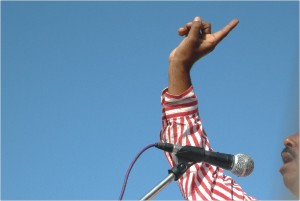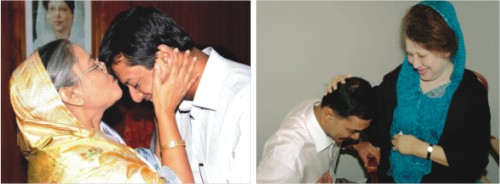
Inside
|
Is this a sea change? Is the current dispensation something new and encouraging or have we been here before, asks Farid Bakht
One cannot say "never" but do you ever see Tarique Rahman as prime minister? I do not. More importantly, if you do not, then that's it for the BNP. BNP without the Zias is just another … Liberal Democratic Party. What about the venerable Awami League? Can you see US-based Joy as PM? Too young, too far. Mum is still around though she looks increasingly isolated and even out of touch. She would have been PM today had her party compromised on the voter list. Doing it now is too little too late. The train has left the station. Withdrawing from that supreme folly of signing up with the regressive Islamic Khelafat movement is meaningless. The secular brand the venerable Awami League owned has been thrown away. If she had sacked General Secretary Jalil and sacrificed some of the old shysters like VIP prisoner Nasim, she would have built up an unstoppable momentum. She was hoodwinked. She should be carrying out an inquest into which saboteurs have been giving out suicidal advice over the last two years. She can the send the names to RAB. The Liberal Democratic Party was meant to be the new secular standard bearer, offering a corruption-lite government. It thought it had avoided the mistakes in 1994 of the breakaway Awami League outfit, Gono Forum. That had noble intentions, ten years ahead of its time. The new doctor, B Chowdhury, brought in by Tarique Zia's dad to manage the BNP, also broke away. His BNP-minus-Tarique formula did not take off. The exodus from BNP did not take place, except for a couple of disgruntled elder politicos. We never understood what the LDP were going to do that was different. The only clear message after two years (in their previous guise of Bikalpa Dhara or "alternative" thinking) was that they had failed to articulate anything alternative. We guessed or hoped they would steal a lot less money than the bad BNP family. Which leads to the retort: They would say that, wouldn't they? Is it different this time? What makes it intriguing is that its leader has actually achieved something and is rather well known abroad. Perhaps too well known. He is popping up in publication after publication, as if the international news agencies had heard that this is an unstoppable force, with more than the civilian in the force. They may be right if they think it is part of a bigger machine. If it is, then those comparisons with Imran Khan are off the mark. On the plus side (from his point of view) the Professor has cultivated friendships at the highest level in the American political elite. Though preferring Hilary, he would get on swimmingly with President Al Gore. While the foreign crowd had been making all the right supportive noises for the LDP, their heart was never in it. In contrast, they are going for it this time and want the Professor as the nominal head of the country. It will all come to nothing if the magic fails to light up the villages. Are there any signs? I am not going to proffer advice on how to proceed. Many commentators are writing reams in articles and editorials. My interest lies elsewhere. What will be the state of the country over the next few years? What kind of choice are we being offered? Is there a choice? Is it all very new? I did not make many friends in accusing the LDP and its forerunner of being old wine in new bottles.
What I ask is that if the wine is new, is it of a superior quality? The operating document for the new administration would be an Aid Consortium strategy paper. Discredited in Latin America and most of Asia (except pliant ever dependable Philippines), the IMF/World Bank brotherhood will find willing pupils in Dhaka. So what is new? Is this new politics? The foreign crowd and Bengali big business have had enough. They have watched the two political behemoths pay lip service to aid agencies. To them corruption is acceptable, indeed essential, but there has to be an end product. British companies can bribe the Saudis as long as the fat king buys the over-priced military warplanes, and sells oil on the cheap. The British PM then blocks investigations into the bribery, in the "national interest." Bengali corruption may be on the high side per capita. In absolute terms, it is way behind. Hypothetically speaking, how many houses does Najmul Huda or his family own in London, compared to Russian billionaires, Third World dictators, or even Oxford University's Benazir Bhutto? Our crore-patis are small fry. The thievery would have been acceptable as long as things got done. They were not. The Saudis sold the oil; we did not sell the gas. So the sea change today is that a replacement team is being put into place to get things done. I am not sure who the final project manager will be. Nagorik Shakti may be the last throw of the quasi-democratic dice. If it looks like going nowhere, the gloves will come off and the real power-brokers will step in.
So is this all that civil society is getting excited about? We are witnessing yet another claim that a new party will be clean. Corruption will be a thing of the past. That is plain nonsense. We will not know the truth until it is too late. In a similar case, Kenya's long serving Arap Moi was ousted and replaced by Western backed democratic new boys making the same promises. Four years later, things have gotten so bad that a normally diplomatic British minister publicly accused them of limitless corruption. We need to hear much more than the promise about getting rid of corruption. The next couple of months will be interesting, to know whether cynicism should be replaced with optimism. Whether we should shed our fears and live in hope. I will leave you with a thought. Current civil society political vision can be described in this way: "People are fed up with the two lady drivers. They are too old-fashioned to realize that a big new prize lies at the end of the highway. So let us replace them with a new driver in a flashier helmet. He will put us into fifth gear and tear up the tarmac. We will feel the wind on our cheeks and we will feel great." What you need to ask is: What good will that do if we are still going the wrong way? Photos: Amirul Rajiv and Star Farid Bakht is a political analyst. |


 The point is that the end product of tenders for power stations should be for gas turbines to produce electricity (at satisfyingly high prices for the suppliers). During the last BNP regime, the end products were retendering and more bribery. Gas stayed under the ground and electricity lines were empty of electrons.
The point is that the end product of tenders for power stations should be for gas turbines to produce electricity (at satisfyingly high prices for the suppliers). During the last BNP regime, the end products were retendering and more bribery. Gas stayed under the ground and electricity lines were empty of electrons.